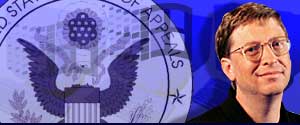| You are in: Business | ||||||||||||||||||||||||||||||||||||||||||||||||||||||||||||||||||||||||||||||||||||||||||||||||||||||||||||||||||||||||||||||||||||||||||||||||||||||||||||||||||||||||||||||||||||||||||||||||||||||||||
|
Friday, 29 June, 2001, 05:29 GMT 06:29 UK
Microsoft break-up ruling overturned

A US appeals court has overturned a ruling that software giant Microsoft must be broken up.
In a damning indictment of the trial judge, the court said the earlier ruling had been "tainted" by the judge's actions and it rejected his conclusion that the software giant must be broken up. However, it agreed in part with the lower court's finding that Microsoft had engaged in illegal anti-competitive behaviour. Microsoft chairman Bill Gates said he was "very pleased" with the appeal court's decision which he said "lifts the cloud of break-up". Mr Gates told the BBC that Microsoft was interested in seeking an out of court settlement to the long-running dispute but would not apologise for its behaviour towards competitors. "We think that litigation is expensive and distracting and, if possible, we would like to see if a settlement can be reached," he said.
The case will now be sent back to a lower court to be reconsidered by a different judge. In a statement, the US Justice Department said it too was "pleased" with the appeals court, since it had agreed that Microsoft had acted as an illegal monopoly. US attorney general John Ashcroft described the ruling as a "significant victory". Gates optimism Mr Gates said that while Microsoft was still reviewing the details of the court's ruling, it was clear it "significantly narrows" the district court's decision. "It sets a much higher standard for these issues than the district court applied," he said. Mr Gates said the past four years had been "challenging" but he was "incredibly optimistic" about Microsoft's future. The company would now take time to decide what further action needed to be taken on legal issues but the business would move ahead as planned. "We are moving ahead with Windows XP as a product that has the features that consumers want," Mr Gates said. "There's nothing in today's ruling that changes our plan for our future products, including Windows XP." Market surge News of the court ruling caused a surge in US stock markets. At the close, the Dow Jones industrial average was up 131 points at 10,566. The Nasdaq composite was up 51 points at 2,126. Trading in Microsoft shares on the Nasdaq was halted after the court's decision and resumed at about 1850 GMT, with dealers reporting heavy buying. The shares closed at $72.71, up 2.21% on the day. 'Serious judicial misconduct' The seven-strong panel at the US Court of Appeals for the District of Columbia heard arguments at a two-day hearing in February. In June last year, Judge Thomas Penfield Jackson had found Microsoft to be guilty of abusing monopoly powers and ordered Microsoft to be split in two.
The court said Judge Jackson was guilty of "serious judicial misconduct" in making derogatory comments about Microsoft. It said this "would give a reasonable, informed observer cause to question his impartiality in ordering the company split in two". The decision to reverse Judge Jackson's ruling was unanimous, by a 7-0 vote. The court said the case should now be reconsidered by a different judge. Improper monopolisation In their ruling, the appeal court judges agreed in part with the lower court that Microsoft had acted illegally. They said the company had improperly monopolised the computer operating system market. But they reversed the finding that packaging the Internet Explorer browser with the Windows operating system had violated anti-trust laws. They also said a third violation cited by the lower court should be judged under a different standard. Legal experts had predicted that the break-up order would be overturned on appeal but that Microsoft would still face restrictions on its business conduct. In the February appeal, Microsoft alleged that Judge Jackson had been biased against Microsoft. The company cited reports where he had compared Microsoft executives to children and Mr Gates to Napoleon. The US Justice Department - which had brought the case with 17 states - countered that the Judge's decision had been prompted by the clear evidence that Microsoft was abusing its position. Appeal process The US Department of Justice had originally hoped to put the appeal process on a fast-track by sending the case straight to the Supreme Court - the country's highest legal authority.
Government lawyers had argued that any delay would give Microsoft valuable time to consolidate its dominant position in the market. The Supreme Court however ruled that the software giant's appeal should first be heard by a lower court. This lower court was expected to be more sympathetic to Microsoft, as it had previously ruled in Microsoft's favour in a different but similar case.
|
Internet links:
The BBC is not responsible for the content of external internet sites Top Business stories now:
Links to more Business stories are at the foot of the page.
|
||||||||||||||||||||||||||||||||||||||||||||||||||||||||||||||||||||||||||||||||||||||||||||||||||||||||||||||||||||||||||||||||||||||||||||||||||||||||||||||||||||||||||||||||||||||||||||||||||||||||
|
Links to more Business stories |
 |
||
| ----------------------------------------------------------------------------------
To BBC Sport>> | To BBC Weather>> | To BBC World Service>> ---------------------------------------------------------------------------------- © MMIII | News Sources | Privacy |